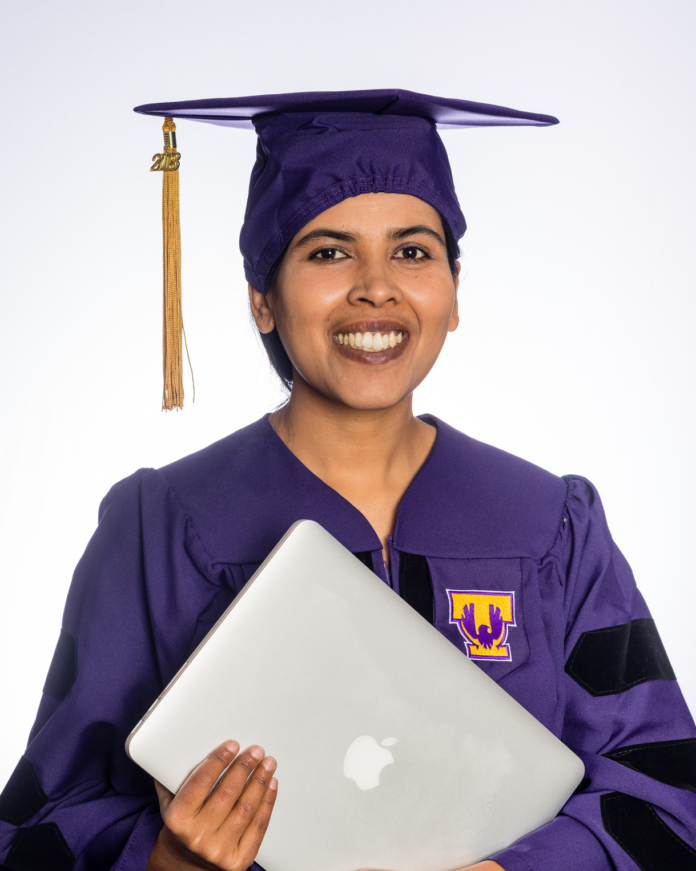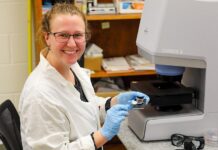COOKEVILLE – When Rina Singh walks the line with other December graduates on Saturday, she will make history as Tennessee Tech’s first female — and the university’s third student — to receive a PhD in engineering with a concentration in computer science.
She has come a long way since her humble beginnings in the small village of Bishwambharpur, Nepal.
“I grew up in a mud house without electricity or running water,” she said. “I spent my days playing in the rivers and ponds of the village, climbing trees in my family’s mango grove and helping my mother with the household chores.”
It was her oldest brother who influenced her decision to pursue higher education. He was attending college in Kathmandu, Nepal’s capital city, and would visit family during his winter vacations. Rina would ask him questions about what he learned while at school and what life was like in the big city.
Listening to his experiences encouraged her to get her degree. But she had some hurdles to overcome.
“Life in the village was hard,” she said. “Girls rarely left to pursue a college education.”
With her brother’s help, they convinced her parents to break with the village’s traditions and send her to Kathmandu to begin the eighth grade. She was 13 at the time.
“I was originally denied admittance into the eighth grade in Kathmandu because my village school did not offer any computer courses,” she said.
Following completion of her secondary education, Rina was accepted into the Nepal College of Information Technology in Kathmandu and was awarded a bachelor’s degree in software engineering in 2006. After receiving her bachelor’s, she worked as a software engineer and research assistant in Kathmandu.
“My uncle, Dhanpat Patel, inspired me to return to school and complete a PhD,” she said. “He inspired me to pursue a higher degree, but I was never really focused on getting a degree from the U.S.”
In 2009, Rina was accepted into Delft University of Technology’s computer science program in the Netherlands. She received her master’s degree from that university in 2012. While searching for PhD programs, she moved to China and began work as a research assistant and in January 2014, she was accepted into Tech’s graduate program.
Her accomplishments also make her the first female in her family to go to college and earn a PhD.
Doug Talbert, associate professor of computer science, was her PhD advisor.
“I helped her plan her course of study and helped her shape her research direction,” he said. “We typically met once or twice a week to discuss how things were going and discussed next steps. I also provided feedback and suggestions to help her develop an ability to do independent research.”
Her area of expertise is data mining and machine learning.
“She has worked (in) sequential pattern mining, finding meaningful and useful patterns in data represented as sequences, and deep learning, the use of large artificial neural networks to discover and make use of very complex patterns in data,” Talbert explained.
Part of her research involved working with a colleague of Talbert’s from the University of Kansas Medical Center to acquire and use some data related to the care of sepsis patients by looking at the sequences of orders that were written on such patients.
They also enlisted the help of the faculty in Tech’s school of nursing.
“Dr. (Susan) Piras, (associate professor of nursing) helped us understand the general process of sepsis care and helped us understand our data well enough to use it to help Rina validate the algorithms she developed,” Talbert said. “To date, Rina’s research has primarily focused on advancing the state-of-the-art in computer science.”
In the last few weeks, they had a long conversation with Talbert’s colleague at the University of Kansas medical center to begin the work of applying her algorithms to actually better understand and hopefully improve patient care.
Computer science is the study of the theories and applications of computers. There are a number of different subfields, including systems software, theory and applications.
The program is starting to take off. The number of undergraduate students enrolled in 2012-2013 stood at 341. Fifteen students were in the graduate program.
During the 2017-2018 fiscal year, 433 undergraduates were enrolled. Forty were enrolled in the graduate program. The 2018-2019 year shows that 485 students are enrolled in the undergraduate program while 54 students are enrolled in the graduate program.
Graduates go on to work in traditional mainstream computing companies, financial, healthcare, entertainment and government sectors.
Rina wants to work in the industry then go into academia.
“I’m very excited to be the first female PhD computer science graduate here at Tennessee Tech,” Rina said. “This program is very competitive and welcoming. There’s such a friendly environment and a great support system here.”









